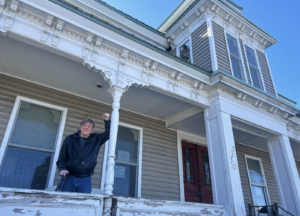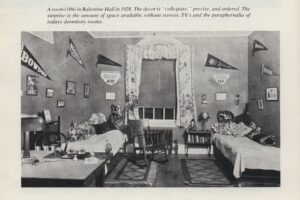
The 22nd annual HOPE Festival was held at the New Balance Student Recreation Center on Saturday, April 23.
The festival, which was sponsored by the University of Maine’s Peace and Reconciliation Studies Program, brought together 60 local organizations and featured activities such as children’s games, poetry readings and documentary films. Locally-grown food was also served.
The theme of the festival was “Creating the Future: Art and Social Change,” according to faculty member and political scientist Stefano Tijerina in an interview with WABI (Channel 5). Other sponsors of the festival were Maine Initiatives, Bangor EcoHomes and WERU Community Radio.
Some of the local organizations in the children’s area included the Windover Arts Center, who helped children make their own hats. Other popular organizations, like the Maine Discovery Museum, put on an activity that allowed children to make “hope bottle necklaces,” where images and messages were placed in tiny glass bottles that were strung together. Youth hockey was also a large part of the children’s area. Local performance artist Zachary Field entertained spectators with a juggling act.
Various student groups volunteered for the event, including Engineers Without Borders, Divest UMaine and the Green Campus Initiative. These groups helped the HOPE Festival promote peace, environmentalism, social change and activism, among other topic areas.
“It’s a very good place to network as an activist,” second-year anthropology student and volunteer for UMaine’s Women’s and Gender Studies (WGS) Department Kirsten Daley said.
“It’s meant to spread the message of hope and peace,” third-year international affairs student and WGS Department volunteer Sarah Dean said. Dean is also the vice president of UMaine’s Amnesty International group, a student chapter of a worldwide organization working to promote and protect human rights. Amnesty International who also attended the event.
A series of words were painted on flags that were hung around the basketball courts, which is the main area where the HOPE Festival was held. They highlighted significant issues such as “Living Wage,” “Environment” and “Education.”
“[The HOPE Festival], for us, really means exposure,” Director of Development at the Maine Audubon, Bryce Hach, said. “What we’re trying to do is to get more people — both University of Maine students and the Bangor community — to become much more aware of the opportunities that are provided at Fields Pond and the Maine Audubon.”
The Maine Audubon is an organization that works to “conserve Maine’s wildlife and wildlife habitat” by engaging people in “education, conservation and action,” according to a statement by the group.
“We just see it as an opportunity to connect with likeminded organizations and to create better visibility than we have had in the past,” Hach said. “[The HOPE Festival] gives a lot of our like-minded efforts real voice to a lot of our similar concerns. I think it helps to bring people together and get to know who each other are and it gives us an opportunity to have our collective voice get a little louder and resonate on a larger scale.”
Documentary films featured stories about a range of topics, from Bolivian quinoa farmers to Islamophobia, a phenomenon that occurs when a person or group has a strong prejudice or dislike against Islam or Muslims. A performance by the LGBT theater group Out and Allied Youth was also on display. The Maine Solar Energy Initiative returned for another year to show participants how to make their own solar cell phone chargers.
Locally-sourced food that was served included ice cream, pastries, salads, bakery items and fair trade coffee.
“The purpose is to celebrate peace and hope and a better world,” Peace and Reconciliation Studies Coordinator and faculty member Barbara Blazej said. “It’s really meant to open up all of this knowledge and all these ideas to campus and the wider community.”
“Any time we have opportunities to talk about and promote peace among young people who go to school here, and others, we take those opportunities,” Blazej said. “It benefits everyone. Whenever we can we want to promote this kind of thinking and these ideas.”
The University of Maine’s Peace and Reconciliation Studies program was established in 1987, which marks 2016 as their 29th year as a program. The program offers many different courses that relate to peace studies. These courses include topics like pacifism, spirituality and environmentally-friendly thinking. They have also been a longtime sponsor of the HOPE Festival.
“I don’t think there really is a place that wouldn’t benefit from people being able to get along better,” Blazej said. “When you think about governments, there are always opportunities and a need for people to be able to work together who see things differently.”











